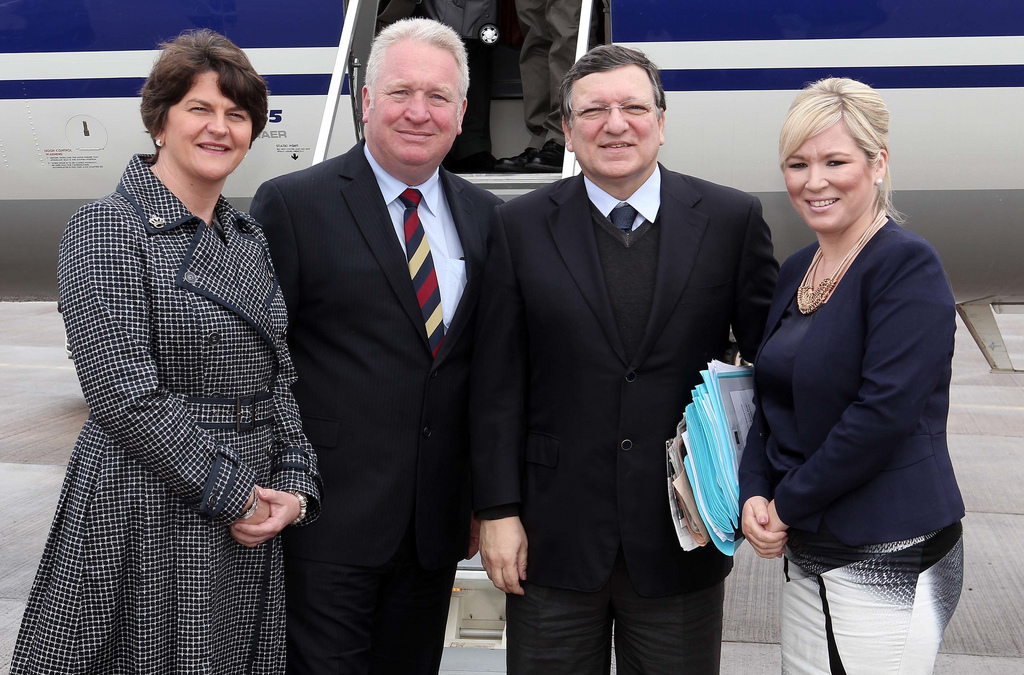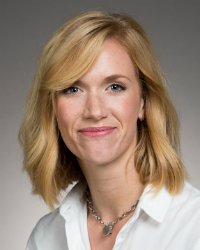‘There is no point having a token woman’: Gender and representation in the ‘new’ Northern Ireland
Northern Ireland continues to lag behind the rest of the UK when it comes to female representation in political life. However, in the elevation of Arlene Foster to First Minister, Northern Ireland joins Scotland in having a female First Minister. Here, Sophie Whiting and Maire Braniff try to explain the low number of female Northern Irish politicians, and argue that it is the duty of the new First Minister to change things for the better.

Northern Ireland politicians Arelene Foster and Michelle O’Neill with Manuel Barosso and Mike Penning MP (Credit: Northern Ireland Office, CC BY 2.0)
Northern Ireland is out of step with its UK counterparts: it has a problem electing women at the national and devolved levels of politics. Whilst the Scottish Parliament and Welsh Assembly have had an average of 37% and 45% of female elected representatives respectively since 1998, Northern Ireland lags considerably behind at just 17%.
The General Election in 2015 presented a rather bleak outlook for gender diversity amongst political representatives in Northern Ireland. Only half of the parties seeking election had more than 30% female candidates and women won only 2 of the 18 seats. The grand total of women being elected to Westminster from Northern Ireland since 1922 stands at 8. Over thirty years of conflict in the region left Northern Ireland behind the modest advancements in gender equality that were occurring in other parts of the UK during the same period. The eventual devolution of powers from Westminster to Stormont in 1998 has been described as a juncture, presenting an opportunity for women to mobilise and to engage in gender-inclusive and transformative politics. With the transition towards peace, the hope was that women’s concerns might be placed at the heart of new agendas. So how have women fared in this ‘new’ Northern Ireland?
A ‘new’ Northern Ireland?
The beginning of 2016 saw Arlene Foster become Northern Ireland’s first female leader and also the first female to lead the Democratic Unionist Party (DUP), traditionally a conservative and male dominated party. With devolved Assembly elections in May this is a pivotal moment to reflect on recent electoral data to discuss what steps can be taken to improve female representation in Northern Ireland. Is it time for parties in Northern Ireland to have a set proportion of female candidates? Will the appointment of Northern Ireland’s first female leader be accompanied by any change in her own party or even across the Assembly as a whole?
The Northern Ireland General Election Survey (2015) confirms that it is not the voting public keeping Northern Ireland out of step, but rather the political parties. The survey found that almost two thirds agree that there ought to be more women MPs and women elected to the Assembly. Likewise, 61% felt that women are better placed to represent women’s interests in politics. Only 11% agreed that a woman candidate would lose votes. Those that did agree tended to be on the basis that discrimination existed within certain parts of the electorate as opposed to women being less capable than their male counter-parts. One striking result from the election survey is the difference of opinion between men and women. Whilst over three quarters of female respondents wanted to see more women elected in to politics, only half of men thought likewise. This shows that not only is Northern Ireland governing elites out of step with better gender balance across the UK, it’s also out of step with the attitudes of the general public, particularly women.
A ‘new’ DUP?
As Northern Ireland’s first female leader, Arlene Foster already has her place in the record books. However, Foster is residing over a legacy within her party that is less encouraging; the DUP has a poor track record in selecting female candidates. Currently in the Northern Ireland Assembly, Sinn Féin is leading the way with 28% of seats held by women whilst the DUP are far behind with 15.7%.
Drawing on survey data of the DUP membership, three distinct trends on gender and political representation are clear. Firstly, women are significantly more supportive than their male counterparts in wanting greater descriptive representation in politics. Secondly, there is a more progressive cohort of party membership who joined the party in the mid to late 2000s; this accompanied the party’s agreement to join the Northern Irish executive and a change of leadership. This newer membership is more likely to identify the existence of discrimination against women in public life and also agree that politics in Northern Ireland would improve if there were more women elected. Thirdly, despite newer members being more supportive of greater gender parity in Northern Irish politics, this is not reflected to the same extent in their views on gender quotas. Therefore, amongst newer members, a stronger recognition of discrimination against women in public life does not necessarily translate into support for positive discrimination; the notion of meritocracy still permeates the party across all levels.
DUP party members, as well as elected representatives, referred to positive discrimination measures as ‘tokenism’ and ‘insulting for women’. However, what was also evident is how certain legacies of the peace process have made positive discrimination anathema to the vast majority in the party. At the time of the peace process Catholics represented only 8% of police in Northern Ireland. In order to counter this underrepresentation a 50/50 recruitment strategy of Roman Catholic/Non-Roman Catholic was implemented for a period of 10 years. This strategy was argued by the DUP leadership to be discriminatory, with 81 per cent of the membership also opposing the initiative. The use of positive discrimination to improve cross-community representation within the police and reach gender equality in politics is viewed by many within the party as synonymous. One DUP councillor emphasised this connection; ‘There definitely is quite a lot of talent in the DUP, some very talented ladies…I believe that people should be chosen—like the police—not on their religion or their gender but their ability no matter what.’
As First Minister, Arlene Foster needs to address the failure of the ‘new’ Northern Ireland by addressing the under-representation of women in politics. Whilst as party leader, Foster has the task of accommodating a burgeoning DUP membership base with a broadening spectrum of attitudes without upsetting the party faithful.
What can be done?
Research suggests that lack of gender diversity in Northern Ireland is not a result of structural factors (e.g. the voting system) but stems from the attitudinal issues within the parties themselves. Through their role as gatekeepers, political parties determine not only the volume of candidates but also the identity of those standing for election. Therefore the solution for Northern Ireland’s leaders can be found close to home. Political parties selection of candidates represent a valuable opportunity to increase female representation in the upcoming elections.
—
Note: this post represents the views of the authors and not those of Democratic Audit UK or the LSE. Please read our comments policy before posting.
—
 Dr. Sophie Whiting is Lecturer in Politics at the University of Bath, researching political violence within the context of global peace processes as well as post-devolution and gender politics in the UK
Dr. Sophie Whiting is Lecturer in Politics at the University of Bath, researching political violence within the context of global peace processes as well as post-devolution and gender politics in the UK
 Dr. Máire Braniff is a Lecturer in Sociology at the University of Ulster
Dr. Máire Braniff is a Lecturer in Sociology at the University of Ulster





 Democratic Audit's core funding is provided by the Joseph Rowntree Charitable Trust. Additional funding is provided by the London School of Economics.
Democratic Audit's core funding is provided by the Joseph Rowntree Charitable Trust. Additional funding is provided by the London School of Economics.
https://t.co/ojIzwzg5Un
‘There is no point having a token woman’: #Gender & representation in Ireland – https://t.co/tgdHwWOnb8 #diversity #inclusion
Great @democraticaudit piece by @mairebraniff & @sophieawhiting on poor #gender representation in N. Irish politics https://t.co/8wQnhvagHM
#Gender #inequality in N-IRL: not structural factors but parties’ role as #gatekeepers to be blamed https://t.co/aR4ZEFARPY @democraticaudit
‘There is no point having a token woman’: Gender and representation in the ‘new’ Northern Ireland https://t.co/b1qWg5mwxV
‘There is no point having a token woman’: Gender and representation in the ‘new’ Northern Ireland https://t.co/aqQ9z1C2gh
“lack of #genderequality in Northern Ireland…stems from the attitudes within #politicalparties” https://t.co/Sq3lUUG1lO via @PJDunleavy
‘There is no point having a token woman’: Gender and representation in the ‘new’… https://t.co/VZy9YELW2b https://t.co/qfNvICQGI3